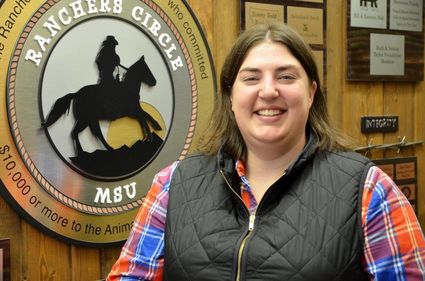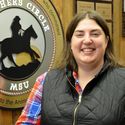Blaine County MSU Extension Service Announces Seed Show Speakers
March 6, 2019

The 70th Annual Montana Seed Show, scheduled for March 14–16 at Harlem High School, is rapidly approaching. In partnership with event organizers, the Blaine County MSU Extension Service is bringing to the Hi-Line several speakers who will be featured during the Seed Show. Blaine County Extension Agent, Juli Snedigar invites area producers to mark their calendars for these sessions, which are free of charge and open to the public.
On Friday, March 15 from 9:00–10:00 a.m., Rick Caquelin will share his expertise on the science of how grass responds to the impact of drought and grazing. Although Caquelin has worked with Natural Resources Conservation Service (NRCS) for over 30 years in both Eastern and Central Montana, he currently serves as the NRCS Area Range Specialist for North Central Montana. He lives at Stanford, Montana, where he spends his free time chasing his own cows.
Then, from 10:00–11:00 a.m., Dr. Megan Van Emon will discuss the value of using body condition scoring and its impact on beef cattle production. In addition, her talk will include information on alternative feeds that may be used during periods of drought when pasture is in short supply, as well as address other practices for protecting a cattle herd during such circumstances.
Van Emon has been an Extension Beef Cattle Specialist at Montana State University (MSU) since 2014. After growing up on a small farm in Northeast Indiana, she received her B.S. and M.S. in Animal Science from Purdue University and her Ph.D. in Ruminant Nutrition at North Dakota State University. Before joining the Animal and Range Sciences faculty at MSU, Van Emon was a Post-Doctoral Research Associate at Iowa State University. With a focus on supplementation strategies and bull development, Van Emon's research and extension programs seek to improve beef cattle production in Montana and throughout the United States.
Finally, on Friday from 11:00 a.m. until noon, the featured speaker will be Dr. Emily Glunk Meccage, the Extension Forage Specialist and an Assistant Professor in the Department of Animal and Range Sciences at MSU.
Most of Meccage's job consists of traveling around the state and region, sharing current research and information regarding forage production, as well as consulting with producers on ways to optimize on-farm forages. Her current research projects concentrate on improving forage quality and production via fertilization and management methods, evaluating management practices for perennial legumes, controlling alfalfa weevil infestation, and using improved forages for animal production. She also participates in several research projects across the state which are assessing the utility of cover crops in ranch and farm management systems.
On Saturday, March 16, at 9:00 a.m., the speaker circuit will continue with a representative from the Montana Department of Agriculture, who will cover hemp production in Montana. This presentation will touch on licensing and production and will be followed by a question and answer session with interaction from the audience.
Assistant Professor of Cropping Systems and Agronomy from the Northern Ag Research Station, Dr. Maryse Bourgault will follow from 10:00–11:00 a.m. Her presentation will provide an overview of the research program that she currently has in place at the Northern Ag Research Station and how it will benefit producers in North Central Montana.
Bourgault possesses a Ph.D. in Plant Science and a B.S. in Environment with an emphasis in Food Production. Her aim is to help improve the productivity, profitability, and sustainability of agricultural systems in Montana and in other dry areas through diversification of cropping systems. She is not only interested in using pulse crops (field peas, lentils, chickpeas) in rotation in cereal-based cropping systems but is also investigating traits related to root systems and drought tolerance in fall-planted crops that could substitute winter cereals. She uses crop physiology methods and modeling to help bridge the gap between field and farm-level productivity and genetic improvement for drought and cold tolerance.
The final speaker on Saturday, from 11:00 a.m. until noon, will be Dr. Jed Eberly, Assistant Professor of Agronomy and Soil Microbiology at MSU Central Agriculture Research Center. During his presentation entitled "Pest Management (disease, insect and weeds) Using Diverse Cropping Systems," Dr. Eberly will discuss the diversity of cropping systems and how they can be used to improve soil health and resiliency in Montana crops to enhance production and long-term farming sustainability in dryland operations.
Eberly's background includes a Ph.D. in Biological and Ecological Engineering from Oregon State University and a B.S in Biology from MSU-Billings. Focusing on the role that soil microorganisms play in improving soil quality and crop performance, Eberly is developing a program that improves a producer's understanding of microbial impacts on agronomic performance of dryland crops in Central Montana. In addition, he is responsible for evaluating the potential for seed and soil-applied microorganisms to alleviate plant stresses and to increase plant growth and crop yields, as well as for managing the cereal crop variety testing program and contributing to forage crop research efforts.
Individuals interested in further information should direct their questions to Snedigar, MSU Blaine County Extension Agent, by calling 357-3200 or by emailing julianne.snedigar@montana.edu.








